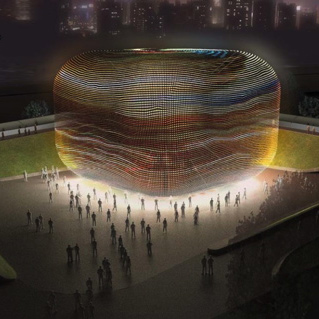
British Shanghai Expo pavilion shortlist 2
Shanghai Expo 2010: Here are more images of the six shortlisted designs for the British pavilion at Shanghai World Expo 2010 (see previous story) plus, further down the story, text describing each one. Above: The Pavilion of Ideas by Heatherwick Studio, Casson Mann, Adams Kara Taylor & Atelier Ten.
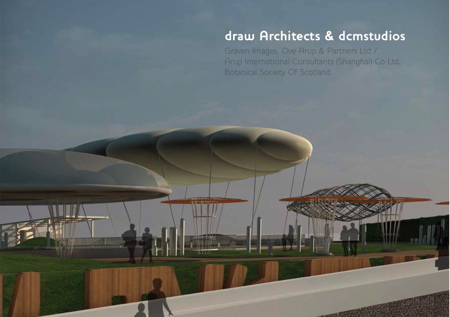
Above: Our Island by draw Architects & dcm studios, Graven Images, Ove Arup & Partners Ltd/Arup International Consultants (Shanghai) Co Ltd, Botanical Society Of Scotland
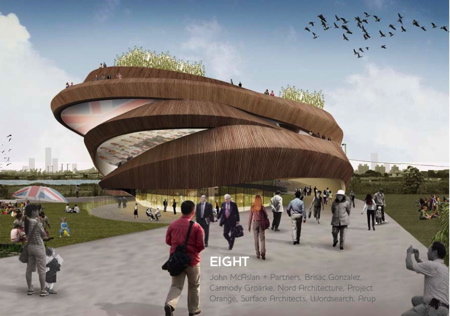
Ribbon of Culture by EIGHT: John McAslan + Partners, Brisac Gonzalez, Carmody Groarke, Nord Architecture, Project Orange, Surface Architects, Wordsearch, Arup
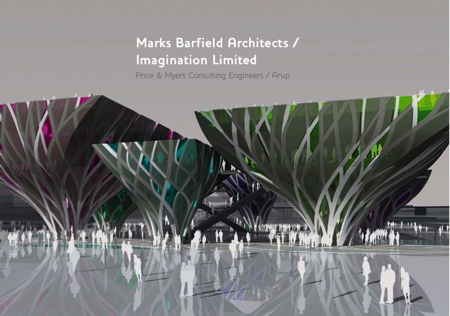
Above: Sharing Innovations, Engaging Nations by Marks Barfield Architects/Imagination Limited, Price & Myers Consulting Engineers/Arup
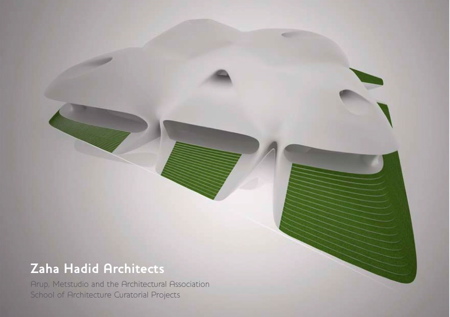
The Network Pavilion by Zaha Hadid Architects, Arup, Metstudio and the Architectural Association School of Architecture Curatorial Projects
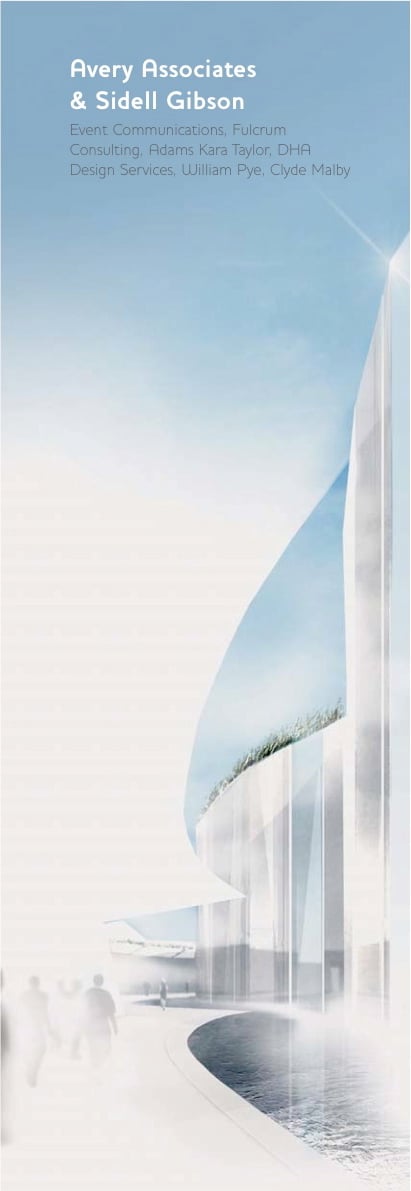
Above: “Better city: Better Life" by Avery Associates & Sidell Gibson, Event Communications, Fulcrum Consulting, Adams Kara Taylor, DHA Design Services, William Pye, Clyde Malby
Below is a statement from each team plus an introduction by competition organiser Malcolm Reading & Associates:
--
SHANGHAI WORLD EXPO 2010
Design Competition Shortlist
Born over 150 years ago out ofthe first Great Exhibition of 1851 in London, World Expo is a major cultural and visitor event attracting international interest. Over 70 million people are expected to visit Shanghai World Expo from May to September 2010.
Six outstanding design teams are competing to make the British Pavilion for the Shanghai World Expo. Their schemes, selected images of which are accompanied by their own words and shown on the pages that follow, will be assessed by a jury and a winner announced on 21st September.
The objective of the competition is to create an entire visitor experience for the pavilion, combining design components to deliver a lasting impression of the British contribution to the Expo theme: Better City, Better Life. The Foreign and Commonwealth Office is overseeing the United Kingdom’s presence for the Expo in Shanghai.
According to the United Nations, the pace of urbanisation across the world will remain very rapid over the next 20 years. Meeting the challenges of urbanisation will require a holistic approach, encompassing issues of quality of life, competitiveness, governance and environmental and financial sustainability.
Britain has extraordinary cultural and creative strengths, which infuse our industries and our national identity. The design industry will be central to British economic development in the 21st century. Expo 2010 provides a platform on which to engage hundreds of thousands of visitors in a conversation about contemporary British identity, the UK’s relationship with China, the common global challenges that face us, and the opportunities they present for mutual growth and advancement.
- Malcolm Reading, Competition Organiser on behalf of the Foreign and Commonwealth Office World Expo is a global event on a grand scale.
The competition to design the UK’s Pavilion at the Shanghai World Expo has been structured, organised and facilitated by Malcolm Reading & Associates on behalf of the Foreign and Commonwealth Office.

The Pavilion of Ideas by Heatherwick Studio, Casson Mann, Adams Kara Taylor & Atelier Ten
The Pavilion of Ideas is a unique display device – an enclosure that throws out from all faces a mass of long, radiating cilia, each ending with a tiny light source. Their length means they gently sway in response to any wind movement.
These cilia, or staves, provide the Pavilion with its only means ofsupport. It rests on its soft forest in an urban field, flanked by two ramped, embracing arms of grass, formed as ramparts under which an auditorium, exhibition space, café, shop and reception spaces are sited. The architecture eschews the need for significant concrete foundations and aims to use simple construction techniques to touch lightly on the site.
Above and peering into these spaces, the Pavilion flickers with patterns of light as it sends its messages, and those ofits visitors, across the site. Each cilium terminates within the Pavilion – with another tiny light source. Inside, clustered together by the form of the structure, they create an enormous engulfing digital screen. This is how the British Pavilion’s content is expressed – outwardly as well as inwardly.

Our Island by draw Architects & dcm studios, Graven Images, Ove Arup & Partners Ltd/Arup International Consultants (Shanghai) Co Ltd, Botanical Society Of Scotland
This is a simple, low building containing the main functional requirements of the brief. It is robust, low cost and 90% recyclable, creating a raised platform for 4 small and stunning rooftop pavilions in a new park: a tea house, a rain garden, the hot air balloon and “English English" pavilion. There will be food and retail, and space for archetypal British events.
The building is a clear metaphor for British urban and rural life. It responds to the urban context of the Expo Park and is outward looking as opposed to being an introverted box. Surrounded by water and landscape, visitors are reminded that Britain is an island nation. The short-span, monolithic structure is formed using recycled rubble, brick and stone contained within wire gabions. These walls are set on a 9m grid running east west.
The roof is formed from standard steel sections and recyclable pre-cast concrete units. As well as the tea house, the planted landscape deck has three feature pavilions which appear as clouds over landscape – they are collectively, whimsical, compelling and very British.
The content will reflect the themes identified in the brief. Working with a curatorial board, we will collaborate with UK Cities, Regions, and Nations to generate new content, levering appropriate existing materials and planned resources to give a vibrant and relevant experience to visitors.
The British pavilion will leave positive legacies in the UK and in China, in our environments, in our economies, in our cultures and in our Cities. We will help to make new friends and will cement new relationships.

Ribbon of Culture by EIGHT: John McAslan + Partners, Brisac Gonzalez, Carmody Groarke, Nord Architecture, Project Orange, Surface Architects, Wordsearch, Arup
EIGHT, a multi-disciplinary design team led by John McAslan + Partners, has submitted a ‘Ribbon of Culture’, their proposals for the British Pavilion at the 2010 Shanghai Expo. Eight draws on the talents of five of Britain’s hottest young practices, supported by Arup and exhibition specialists, Wordsearch.
The five young practices involved in the design are NORD Architects, Project Orange, Surface Architects, Carmody Groarke and Brisac Gonzalez.
The British Pavilion is a journey. A sutra, as one of Eight’s architects put it, a treatise in the form of a rope or thread that holds things together – but not too tightly. The French philosopher Michel de Certeau put one aspect of journeying quite brilliantly in his book, The Practice of Everyday Life.
Cities, he wrote, are strategic concepts, which only individuals could ‘walk into existence’. The British Pavilion, and its glimpses of British city life and the life of Shanghai beyond, is a walk into different existences, an expedition through our national experience of urban conditions – its history, culture and social and physical environments.
The architecture is like a ribbon, or even a curling strip of cinematic celluloid. It’s a fluid experience, an urban mandala whose paths widen and narrow, touch and cross, offering changes of pace and perception. There are views and vantage points, outward to Shanghai, and inwards to the Pavilion’s central event space.
As one of EIGHT’S architects put it, a container that need not contain.

Sharing Innovations, Engaging Nations by Marks Barfield Architects/Imagination Limited, Price & Myers Consulting Engineers/Arup
Reflecting the Shanghai World Expo 2010’s ‘Better City, Better Life’ theme, this proposal comprises eight independent yet connected ‘tree structures’ which, together, demonstrate the unparalleled cross-section of innovation in contemporary Britain.
Designed to create a memorable and impactful presence, the remarkable exterior architecture, featuring overhanging structures and rooftop gardens, is matched by a compelling visitor experience that reflects upon the nature of cities and the communities that live within them.
Created through a shared, ‘open-source’ collaboration with the British population (who will be invited to contribute stories and experiences), these opinions will be curated and fed into the ‘roots’ of the tree structures to influence the final content for the pavilions.
Then, at the Expo itself, Chinese visitors will also be able to interact and shape the content so that, overall, we can create a unique platform for engagement and dialogue between the people of Britain and China.
The UK Shanghai 2010 NETWORK PAVILION tells the story of our world’s—and the UK’s world-leading—creative, cultural and economic networks in the early years of the twenty-first century. We have created this pavilion at the dawn of a new century; a century already being defined by GLOBAL NETWORKS.

The Network Pavilion by Zaha Hadid Architects, Arup, Metstudio and the Architectural Association School of Architecture Curatorial Projects
We have named the project the UK China NETWORK PAVILION, and it has been designed to both display and embody the network sensibilities and realities of our time. The pavilion is lightweight, low-cost and sustainable. It is also a spectacle and memorable: a structure fusing content with architecture, the individual with a crowd; learning with entertainment.
It is a pavilion that creates experiences never seen before in an exposition pavilion, and which connects the UK to the exposition’s home country, China, in ways that demonstrate the unique place the UK occupies worldwide within its own networks: from those of its multi-cultural regional cities, to the Commonwealth, the EU, global finance, international tourism and travel, world heritage, popular culture, and the worlds of design, creativity and the arts.

“Better city: Better Life" by Avery Associates & Sidell Gibson, Event Communications, Fulcrum Consulting, Adams Kara Taylor, DHA Design Services, William Pye, Clyde Malby
The world is urbanising at an unprecedented rate, but leaving the daily toil ofthe land for a ‘better life’ in the city results in tensions for overworked city dwellers whose desire for prosperity is counterposed by a deep rooted need to maintain their eons-old way of life and traditional rapport with nature.
This re-connection with nature is Britain’s gift to the ‘better city’: The pavilion is thus a metaphoric public park with a lake and an island and in this island pavilion lives the island nation, a fabulously dynamic and inventive race whose exploits and achievements have become legendary.
To get there however, requires an odyssey along a disorientating mist shrouded path and across some stepping-stones... which may or may not be there...